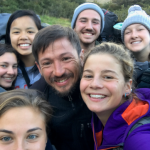Support
During my semester abroad in Valparaiso, Chile, I was fortunate enough to trek the W Loop in Torres del Paine, Patagonia, the globally-known pristine national park. This trip would not have been possible without the support from the Cabot Family Foundation and the Santiago Exchange Network, SEN, a company that has a core philosophy of immersing students who are studying abroad to international travels in South America. During the trip, I specifically focused on ecotourism and its economic and environmental impacts. I decided to study ecotourism and the ripple effects because of my dual major; Environmental - Psychology, and the many parallels that can be drawn between the two subjects.
Before traveling to Patagonia, I broadened my perspective and defined ecotourism to gain a better sense of my studies. What I had gathered is that there are many sides to ecotourism, both good and bad. Ecotourism contributes positively to the local economies by increasing capital and employment opportunities; however, it negatively impacts the natural environment and damages the native vegetation. It is challenging to determine whether or not ecotourism is actually good or bad for areas because both impacts seem to outweigh one another. Although ecotourism plays devils advocate against itself, I concluded that ecotourism embraces ideas of responsible travel that continues to conserve the natural environment and the local people. With this in mind, I began to solely pay attention to the tourist industry in the Torres del Paine National Park, Patagonia.
While hiking the W circuit with the SEN leaders and other five group members, I was able to talk to different guides along the way about the tourist industry. Each guide had something positive and negative to say. Many discussed the issue of air, waste, and land pollution from the amount of tourists. They expressed their concerns about the crowds that overuse the park and destroy the environment. Although there are still crowds touring the park, permits have been enforced to allow a certain amount of individuals with certain qualifications to trek within the park. This has substantially limited the amount of traffic, but not enough in the eyes of many guides. Others also discussed how important it is for tourists to visit and be exposed to a different culture. They believe that if more tourists come and see the national park, they will be inspired to be more sustainable and preserve green spaces. This was interesting to hear as I had not thought about the cultural and sustainable aspect and focused only on the economical benefits.
Spending a week in Torres del Paine was not enough time to explore all the hidden gems of the national park; however, the week for me was impeccable and still is indescribable. I have hiked mountain ranges in the East and West coast of the United States, but Trekking the W circuit is unlike any hiking that I have ever done because of the environment’s natural variability. The colors of the water, the structure and formation of the rocky ridges, the magnitude of the sunrise over the Horns, the gigantic glaciers on Glacier Pond, all were breath taking. While I gained a deeper appreciation and want to preserve the surrounding beauty, the conversations I had with the guides changed my perspective about national parks greatly. Listening to their stories and lessons learned were what made the trip for me.
Looking back on my study abroad experience, this will be a memory of mine that I will forever hold close to my heart. My dream of traveling and hiking in Patagonia came true, holy smokes! I still cannot believe it, but the semester allowed me to do many other things that I am truly grateful for. Learning another language has been incredibly rewarding and I made some remarkable relationships, but what I learned the most that I will continue to follow is that in order to achieve your trustiest potential, you must be comfortable with being uncomfortable.
